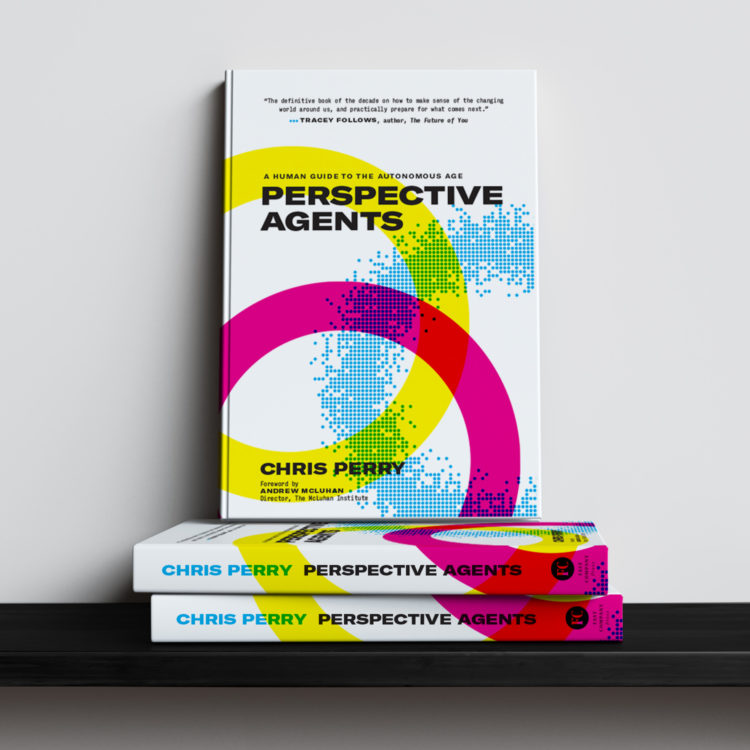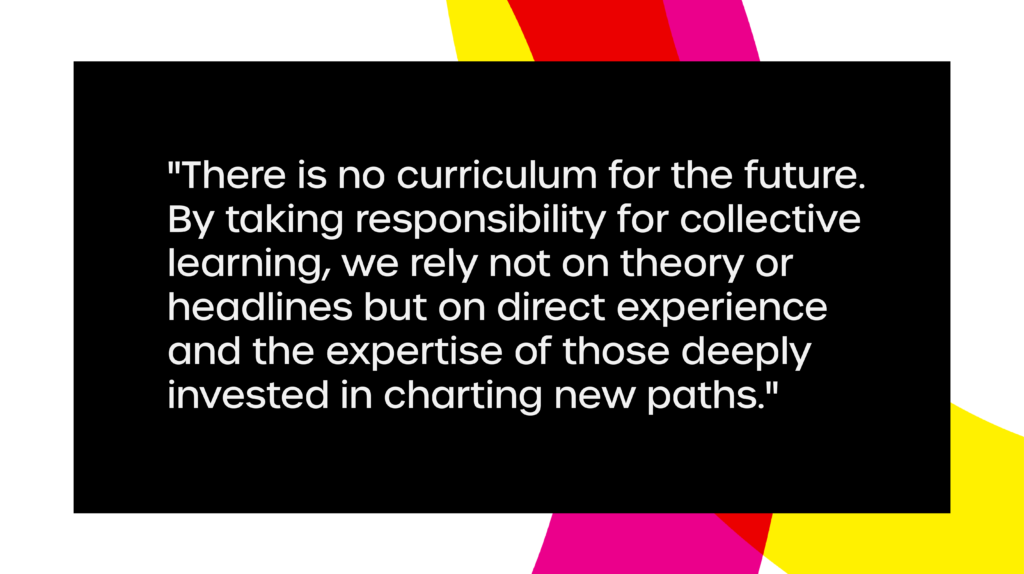It’s been nearly six years since we started tracking cultural and social implications of tech via the On AI newsletter (formerly Media Genius). For those who have followed since the beginning, you’ve seen us unpack shifts from the introduction of deepfakes, to the rise of TikTok, to the quiet fall of institutional pillars. We’ve shared how leaders are navigating rapid change, asked how you’re doing the same, and curated findings in comprehensive research reports and guides. All of this work has painted a bigger picture of complex and rapid societal shifts—and unveiled a new framework for navigating the opportunities and challenges that accompany them.
I’m thrilled to share the culmination of that thinking: Perspective Agents is out in bookstores now. While newsfeeds and bookshelves are overloaded with AI analysis, we need more on the human and social implications of the “autonomous age” we’ve entered.
To face this era with optimism, perspective becomes an essential, profoundly creative pursuit to invest in. It starts with big questions impacting all of us. Is there a common cause behind crises of understanding, conflict, polarization, and mental health? How can we make sense of important events when social media, disinformation, and bots misdirect us? Will AI solve these problems or perpetuate them? Are there ways of seeing that foster optimism over doom that’s pervasive online?
These questions point to new scenarios we’re not naturally wired to think about. Prepare yourself to face more of them.
Personal acts like writing a book, finding love, or pondering life’s meaning will be increasingly mediated by AI. Human-machine collaborations will uncover new truths, throw shade on old ones, and transcend the current limits of our understanding. Signals of change covered throughout the book will challenge how you look at this new world.
Doing so is a lot to take in. Ideas and stories in Perspective Agents are intentional provocations grounded in cases we often don’t see. Think of the chapters as kaleidoscopic trailheads, with depictions of alternative realities and influences behind them.

Orienting to the Text—and the Moment
This book is designed for those who seek to understand the reasons behind events (‘why’, covered in parts one and two) and those keen to learn actionable strategies (‘what to do’, discussed in part three).
Why should you invest your time in both?
Understanding underlying causes will enhance your ability to act confidently. Bridging the gap between knowing ‘why’ things happen and understanding ‘what’ to do about them is essential for anticipating, preparing, and planning for inevitable changes to come.
In all, the book includes thirteen different lenses on ways to view and anticipate them. It’s written so you can tailor your read to areas of the most interest.
Practically speaking, how might this manifest? For those in the media, communications, or marketing roles, think about this:
- Media experiences: The “UX” of digital media will be reconstructed over the next 3-5 years. With AI-powered chats and avatars, answers to pressing questions won’t primarily come from Google searches, websites, or social recommendations. They’ll be delivered by agents. This will radically change digital marketing, SEO, PR, and attention-engineering practices codified over the last 30 years.
- Content flows: Without better intelligence tools and analysis, information flows will continue to confound leaders. Algorithms already determine what we see. What happens when a flood of AIs, botnets, and synthetic media enter the picture? We need to move beyond the notion of storytellers or broadcasters. We need to think and operate with an AI and “network” mindset.
- Intelligence engines: Skeptical about the accuracy and value of outputs from Gen AIs today? Experts believe within the next two years, the best engines will have 10x better output than they currently deliver. It’s hard to contemplate what 10x means. Just don’t bank on judgments today; they may not hold months from now.
These are a few revolutionary media changes around the bend. It begs a personal question. How can you prepare for—and even shape—what’s in store?
With Perspective Agents as a grounding guide, there are several ways:
- Expand your base knowledge: Check the bibliography for further reading. For media and marketing types, titles like Understanding Media, The Coming Wave, The Content Trap, The Future of You, Imaginable, and Social Fact will give you a sense of mind-shifts necessary to move into a different future.
- Stay informed: Utilize newsreaders (I use Feedly) to follow news and insights from human-centric thought leaders like Andrew McLuhan, Douglas Rushkoff, Zoe Scaman, Rishad Tobaccowala, Jia Tolentino, and Charlie Warzle.
- Think and create using new tools: Use AI engines such as Perplexity, ChatGPT, Stable Diffusion, OpinionateIO, and AudioPen. Understanding the evolution of media and communication requires hands-on experience with tools reshaping it.
- Join or arrange discussion forums. We all need help to learn, given the acceleration of change. At Weber Shandwick, we have teams in real-time exchanges on AI developments. We invest in student communities. We’re in cohorts with a wide array of experts to contemplate the effects new technologies bring to our lives and work. Collaborations of this sort accelerate necessary learning, judgment, and action.
There is no curriculum for the future. By taking responsibility for collective learning, we rely not on theory or headlines but on direct experience and the expertise of those deeply invested in charting new paths. We’re all starting from a place of unknowing, with huge opportunities and risks hanging in the balance.

AIs are only tools but present incredible power to reshape us in ways we still don’t know. How we speak to human needs and address new challenges with clear eyes requires that we intentionally widen our lens.
In this renaissance period, a myopic mindset is not an option. Perspective Agents points to what’s coming, hopefully prompting new questions and avenues to help us make the best of it.
-Chris Perry


